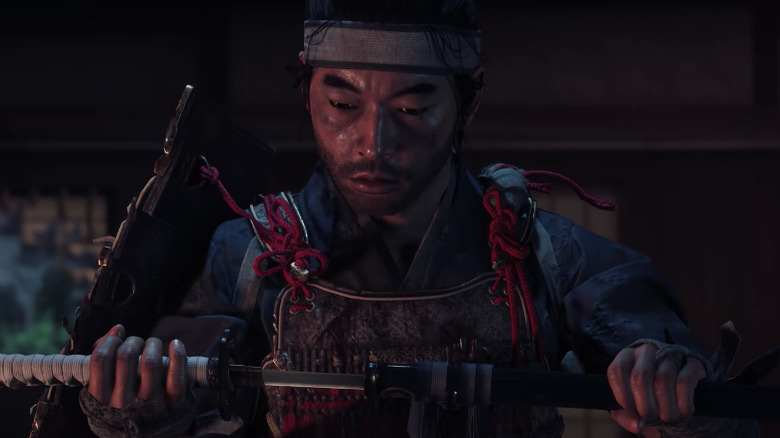What The Critics Are Saying About Ghost Of Tsushima
Following a frustrating delay, the release of Ghost of Tsushima is finally upon us. This week, critics have finally gotten their hands on Sucker Punch's samurai epic, and the reviews are rolling in. With that in mind, let's check out some spoiler-free reactions from the gaming press.
So far, critics have heaped tons of praise on Ghost of Tsushima. In particular, IGN adored the game's characters and writing. IGN's review even called main antagonist Khotun Khan "one of the most memorable game villains of recent memory thanks to his soft intensity that is oddly calming despite his terrifying intentions," which made him one of the highlights of the game's significant runtime. IGN also referred to the game's combat system as "exquisite," comparing it to the likes of the Batman: Arkham series and Sekiro: Shadows Die Twice.
Gaming Age's Tyler Nethers compared the gameplay to the more recent entries in the Far Cry series. Nethers' review was also highly impressed with Ghost of Tsushima's visuals, writing that it "consistently impressed and surprised me, and it is probably my favorite game of this generation visually."
In a slightly more measured response, Eurogamer called Ghost of Tsushima "a likable, if clunky blockbuster." While Eurogamer also applauded the game's combat mechanics, the review was a bit more lukewarm towards the story and script. Eurogamer's review was also critical towards the game's side quests, which Eurogamer referred to as "almost an afterthought" within the game.
One big surprise is that Japanese critics are absolutely adoring Ghost of Tsushima. As pointed out by Kotaku, there is oftentimes a bit of a disconnect that occurs when American developers or producers bring a Japan-centric property to life. This can be seen in such films as the American remake of Ghost in the Shell, which has been accused of cultural insensitivity and was relatively seen as a critical disappointment.
Kotaku rounded up several reviews from Japanese critics that had kind things to say about the game's authenticity. Some critics praised the mostly-accurate Japanese used throughout the game, with one reviewer even saying that the game could help people studying more archaic words in the language. Others lauded the level of detail put into rendering the Japanese countryside and the realistic relationships between characters.
Most notably, Japanese gaming magazine Famitsu gave Ghost of Tsushima a perfect score. As Kotaku noted, this makes Ghost of Tsushima only the third Western game in the publication's history to receive such a high rating, the other two being The Elder Scrolls 5: Skyrim and Grand Theft Auto 5. That's right; in the eyes of Japanese critics, Ghost of Tsushima is officially playing with the big boys.
One aspect of the game that has been somewhat divisive is the game's so-called "Kurosawa Mode." This mode of the game renders everything in stark black and white and uses the Japanese audio track for all of the actors. It also adds a bit of grain to the overall picture and tweaks the sound quality to make it sound similar to an older movie. In essence, this allows the game to imitate the look and feel of a film directed by cinema legend Akira Kurosawa, the man behind such classics as Throne of Blood, Rashomon, and Seven Samurai.
Game Informer's Jeff Cork was split on the mode's efficacy as a game playing experience. Cork acknowledged that the cinematic quality of Kurosawa Mode was indispensable. Cork wrote, "Kurosawa mode is, in a word, breathtaking. Even though I doubt the game's visual design was cobbled together with black-and-white visuals in the front of the team's mind, you might be able to convince me otherwise."
However, the black and white visuals have made certain parts of the gameplay harder to pull off in practice. For instance, there are parts of the game that ask you to find flowers of a particular color. Obviously, this is a next-to-impossible task when playing a game that's fully in black and white, so that may necessitate you toggling back to standard color mode in order to finish the mission. The lack of color can sometimes make the visual cues during combat harder to decipher, which can literally make using Kurosawa Mode the difference between life and death. That breaks the immersion a bit, which led to Cork admitting that he couldn't fully recommend Kurosawa Mode for a first playthrough of Ghost of Tsushima.
If these reviews have you chomping at the bit to play the game for yourself, you're in luck. Ghost of Tsushima hits stores tomorrow for the PlayStation 4.

